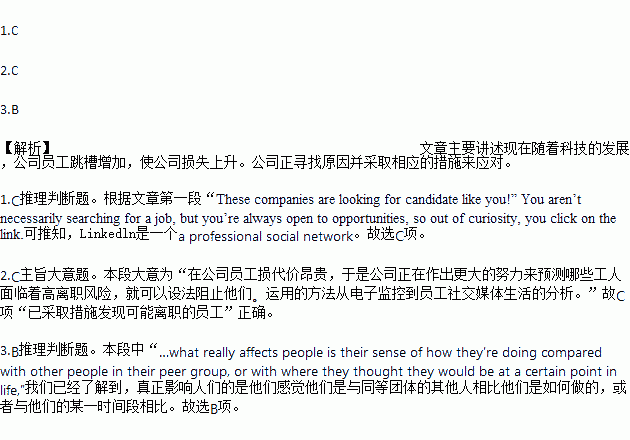题目内容
Imagine that you’re looking at your company-issued smartphone and you notice an e-mail from Linkedln:“These companies are looking for candidate like you!” You aren’t necessarily searching for a job, but you’re always open to opportunities, so out of curiosity, you click on the link. A few minutes later your boss appears at your desk. “We’ve noticed that you’re spending more time on Linkedln lately, so I wanted to talk with you about your career and whether you’re happy here,” she says Uh-oh.
It’s an awkward scene. Attrition(损耗) has always been expensive for companies, but in many industries the cost of losing good workers is rising, owing to tight labor markets. Thus companies are making greater efforts to predict which workers are at high risk of leaving so that managers can try to stop them. Methods range from electronic monitor to sophisticated analyses of employees’ social media lives.
Some of this work may be a reason to let employees to quit. In general, people leave their jobs because they don’t like their boss, don’t see opportunities for promotion or growth, or are offered a higher pay; these reasons have held steady for years.
New research conducted by CEB, a Washington-based technology company, looks not just at why workers quit but also at when. “We’ve learned that what really affects people is their sense of how they’re doing compared with other people in their peer group, or with where they thought they would be at a certain point in life, says Brian Kropp, who heads CEB’s HR practice. “We’ve learned to focus on moments that allow people to make these comparisons.”
Technology also provides clues about which star employees might be eyeing the exit. Companies can tell whether employees using work computers or phones are spending time on (or even just opening e-mails from) career websites, and research shows that more firms are paying attention to these things. Large companies have also begun tracking badge swipes(浏览痕迹)—employees’ use of an ID to enter and exit the building or the parking garage—to identify patterns that suggest a worker may be interviewing for a job.
1.From the first paragraph, we can infer Linkedln is ________.
A. an e-mail
B. a job from the Internet
C. a professional social network
D. a world-famous company
2.What’s the main idea of the second paragraph?
A. The cost of losing good workers is rising.
B. Companies are stricter with workers than before.
C. Measures have been taken to find the potential workers who want to quit.
D. Finding new jobs has been a trend for most workers.
3.According to the research by CEB, which of the following might be the most probable reason for workers to quit their jobs?
A. They don’t like their bosses.
B. Workers are always doing comparisons.
C. Not seeing opportunities for promotion.
D. To find a higher-paid job.
Student Job Center
Job #: 45961 | |
Employer: MJ Homecare | On Bus line: No |
Pay: $12.50-$16.00/hr | Posted: 05/26/2017 |
Category: Health Care-Medical | Deadline: 07/04/2017 |
Number of Positions: 3 | |
Contact Information: Name: MJ Ford Email Address: wiscwiscwisc@gmail.com Address: Verona, Wisconsin 23333 Primary Phone: 623-623-2333 | |
Description: Outgoing, fun, disabled man on Madison’s far west side has immediate need for assistance with morning and/or evening cares. Times are somewhat flexible. Morning duties (8 AM) include transferring, assistance dressing, bathing, bowel care (肠道护理) and other activities associated with morning routine for the disabled. Short evening shift duties include help with bedtime, usually between 8-9 PM. Apply for either shift. Lifting is a vital part of this job. Experience with manual, pivot-type transfer and bowel care is preferred, but will train. Additional information is available upon request. Pays $12.50+/hr. Car needed. This position is great experience for anyone interested in a career in the medical field—nurse, PA, doctor, occupational therapy, physical therapy, etc., but not limited to those areas of interest. A very rewarding position that makes a difference, helping to remain independent in your life. If you enjoy helping others, then this job may be for you! Please respond by email and include your phone #. https://jobcenter.wisc.edu/jobs/detail/45961 | |
1.If you successfully land the job, it is better for you to ________ there.
A. ride a bus B. take a train
C. drive a car D. travel on foot
2.This job is targeted at those somewhat strong students ________.
A. who are experienced and available for both shifts
B. who are outgoing and good at caring skills
C. who are determined to get jobs in the medical field
D. who are caring and ready to live on their own

